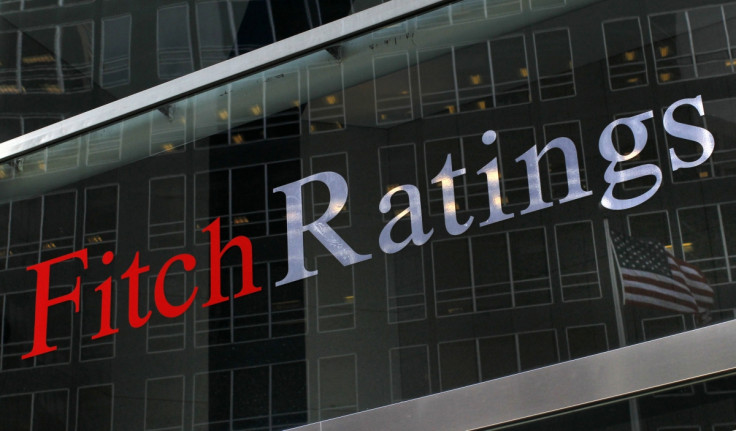Fitch cuts global growth forecasts for 2015 and 2016 on weaker emerging markets

A buoyant US economy will drive global growth in the coming years while recovery continues to falter in the eurozone, Japan and many large emerging markets, Fitch said and added that the overall outlook has marginally weakened since September's Global Economic Outlook (GEO) and risks remain skewed to the downside.
"Compared with the September GEO the forecasts are 0.1pp lower for 2015 and 2016, mainly due to emerging markets," the rating agency said in a press release on 8 December.
Fitch's latest forecasts for world GDP growth, weighted at market exchange rates, are 2.5% in 2014, the same as in 2013, picking up to 2.9% in 2015 and 3% in 2016.
The US engine
Fitch said it has maintained its US GDP forecast of 3.1% in 2015 and 3% in 2016, the strongest among major advanced economies, up from 2.3% in 2014.
"The US economy expanded at a rapid annualised 3.9% in 3Q14. Private consumption will be a key growth driver, supported by rising household disposable income and a strengthening labour market," Fitch said.
The US unemployment has dropped to 5.8% in October, below the level originally targeted by the Fed as a trigger for raising interest rates and getting close to Fed estimates of the "natural rate", the rating agency noted.
Eurozone
Meanwhile, the eurozone recovery remains fragile, with weakness widespread across member countries in both the periphery and the core, Fitch said.
"The last two quarters witnessed a marked slowdown in Germany, where year-on-year growth sagged to 1.2% in 3Q14 from 2.3% in 1Q14."
Fitch said a pick-up in German demand will be vital for the eurozone outlook and projected the region's growth at 0.8% in 2014 and 1.1% in 2015, down 0.1pp and 0.3pp respectively from September's GEO. Growth for 2016 is unchanged at 1.5%.
Despite highly accommodative ECB monetary policy and broadly neutral fiscal position, Eurozone growth is dragged by private sector deleveraging, structural bottlenecks and spill-over from geopolitical risks, Fitch said.
"High unemployment will persist and remain above 11% until 2016."
Fitch said the eurozone will avoid protracted deflation, but it remains a meaningful risk, in view of current low inflation, weak demand and the potential for self-reinforcing dynamics.
The ratings agency has projected eurozone inflation at 0.6% in 2014, 0.9% in 2015 and 1.3% in 2016.
Oil slide impact
According to Fitch, the gap between headline and core inflation will widen globally in the near-term as lower energy prices increase downward pressures on headline inflation rates.
The rating agency said lower oil prices will boost global growth. It has cut its forecast for Brent oil prices to $100/b in 2014, $83/b in 2015 and $90/b in 2016, following the sharp drop in recent months and OPEC's failure to take action to reverse it.
"We expect prices to rise from current levels as demand picks up, in line with our assumption of stronger global GDP growth in 2015 and 2016, and lower production," the Fitch statement said.
"A 20% fall in oil prices will boost the level of global GDP by around 0.3% over two years, but will create big losers as well as winners."
EM story
Emerging market economies face larger and more persistent weaknesses than previously expected, Fitch said. It forecasts EM growth to slow to 4% in 2014 from 4.7% in 2013, before edging up to 4.1% in 2015 and 4.5% in 2016.
"Brazil entered a technical recession earlier this year and Fitch expects another challenging year in 2015 with GDP growth of just 1%, as the new government tightens economic policies to address the imbalances that have developed in recent years and to revive confidence."
"Russia will fall into recession in 2015 with GDP contracting 1.5% under the combined weight of western sanctions, sharply lower oil prices and tightening financial conditions. Investment remains firmly in negative territory, real wage growth is close to zero and household demand is marking time."
Fitch said China's slowdown is structural and added that it expects the world's second largest economy's growth to moderate to 7.3% in 2014, 6.8% in 2015 and 6.5% in 2016 as it gradually rebalances while seeking to contain leverage.
"India will be the only BRIC country where growth picks up in 2014 to 5.6% and accelerates to 6.5% in 2015 and 6.8% in 2016, owing to the government's reforms to the business environment," the ratings agency said.
Japan and UK
Fitch said Japan's unexpected economic contraction in 3Q14 has prompted it to cut its short-term GDP forecast, while growth in the UK has been strong and broad-based.
"We now forecast Japan's 2014 real GDP at 0.8%, a downward revision of 0.6pp from September. However, we believe some of the drag is temporary and that a broader range of factors remain conducive to stronger growth, and on this basis have revised up our 2015 forecast to 1.5% from 1.3%."
Fitch's 2016 forecast for Japan GDP is unchanged at 1.3%. "Higher wage growth is central to Japan's prospects of sustaining higher real and nominal GDP growth."
Fitch said it has maintained its forecast that UK's growth will slow from 3% in 2014 to 2.6% in 2015 and 2.3% in 2016, as it converges on its medium-term potential rate of 2%-2.25%.
"An absence of inflationary pressures, despite tightening labour markets, implies the Fed and Bank of England will follow a slower monetary policy tightening path."
According to the ratings agency, the base case is for nominal wage growth to pick up as labour market slack is absorbed and the currently weak productivity growth improves, in line with previous cyclical recoveries.
© Copyright IBTimes 2025. All rights reserved.






















